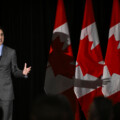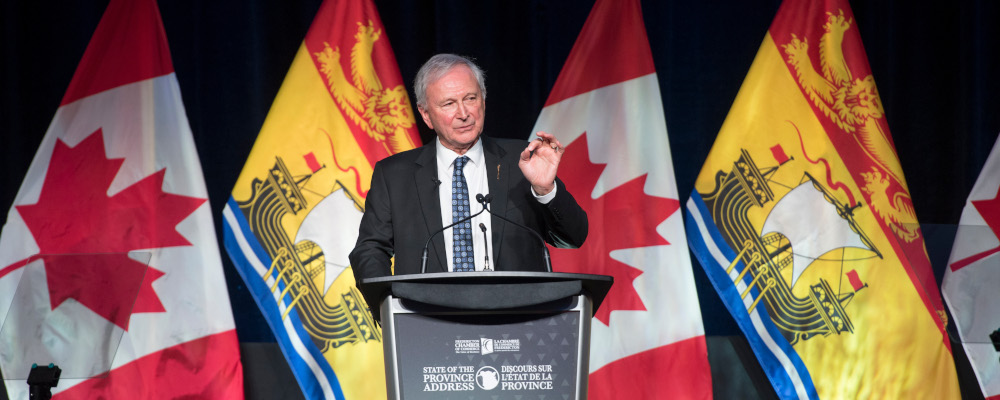A long-simmering debate over the handling of gender identity issues in schools has finally boiled over into mainstream Canadian politics this month when New Brunswick’s Progressive Conservative government publicly fractured over a contentious review of Policy 713 (also called the Sexual Orientation and Gender Identity policy). Undeterred by the pushback from within his own caucus, Premier Blaine Higgs has vowed to move forward with proposed changes to the policy, telling reporters that he’s willing to call an election over the issue. (Such an election would mark the first time Canadians went to the ballot box over gender identity).
Introduced by the Progressive Conservative government in the summer of 2020, Policy 713 enumerated a set of minimum requirements for the recognition of sexual orientation and gender identity (SOGI) in the province’s public schools; including a requirement that teachers use the preferred names and gender pronouns for students in all grades (even in cases where parents were unaware). After reportedly receiving several complaints from parents, the Higgs government launched a formal review of Policy 713 this spring.
The review (now complete) has resulted in three major changes to Policy 713; the most significant being that children under the age of 16 will now need to obtain parental consent to adopt names or pronouns that differ from the ones on the school roster. The changes are scheduled to come into effect on July 1.
Higgs has been a vocal (and highly visible) proponent of the changes to Policy 713, appearing on multiple political talk shows to defend his position. His rhetoric has at times echoed the attacks on so-called gender ideology that have become commonplace in conservative circles south of the border.
Higgs, who rose to power five years ago by exploiting divisions on the status of bilingualism in New Brunswick, is clearly gambling on another contentious wedge issue to reverse his failing political fortunes. (Just a quarter of New Brunswickers said they approved of Higgs’ performance back in March). For now, Higgs appears to have public opinion on his side. A recent poll conducted by Montreal-based market research firm Leger found that seven-in-10 respondents in Atlantic Canada agreed that schools should be required to inform parents when students express a desire to change their gender or pronouns. (57 percent of respondents across Canada held the same view).
But Higgs should be careful not to overplay his hand on this sensitive matter. Recent experience shows that voters can easily be put off by campaigns that focus too heavily on LGBT+ issues, even when they generally agree with the sentiment being expressed.
Several Republican candidates learned this the hard way in last year’s midterm elections. With polls showing that three-quarters of Americans objected to teaching children that they can choose their own genders, Republican campaigns across the country doubled down on rhetoric targeting gender identity in schools. The results were, at best, mixed, with candidates who embraced this messaging falling to defeat in several high-profile races.
The rhetoric may also have triggered a backlash from Millennial and Gen-Z voters, who turned out to vote in higher-than-expected numbers (nationwide, one-in-five Gen-Z adults self-identify as LGBTQ). Exit polling showed that just 5 percent of voters viewed “transgender health care and participation in sports” as a top issue.

Higgs risks falling into the same trap as he prepares to wage an election campaign over an issue that directly affects, at most, a few hundred of the 100,000 or so students enrolled in New Brunswick’s public school system. (Across Canada, roughly one in 300 people identify as transgendered or nonbinary). Even if they agree with him in principle, critical swing voters may still abandon Higgs if they sense that he is trying to “weaponize” this issue at the expense of already vulnerable transgender communities. Public opinion may also shift as voters hear more from students who will be negatively impacted by the changes to Policy 713.
Even if his changes to Policy 713 are broadly popular with New Brunswickers, Higgs should be wary of plunging voters into an election over the policy. As recent experience in the United States has shown, campaigns that centre on LGBT+ issues can take sudden and unpredictable turns. In his struggle for political self-preservation, Higgs has stumbled upon a combustible issue that could well blow up in his face.
Recommended for You

Matthew Grills: Joey Chestnut is America

Peter Menzies: Justin Trudeau’s legislative legacy is still haunting the Liberals

‘Our role is to ask uncomfortable questions’: The Full Press on why transgender issues are the third rail of Canadian journalism

Need to Know: Mark Carney’s digital services tax disaster




